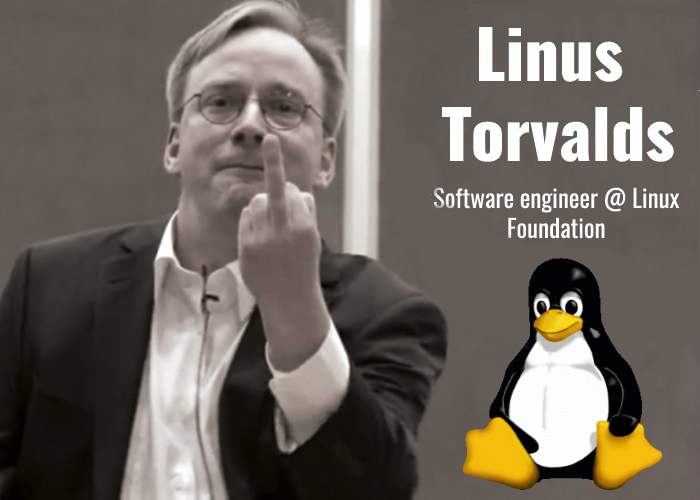The White Hat Hacker that Started a Revolution
The utterance of the name Linus Torvalds, or the presentation of an image of a large penguin called Tux, arouses admiration in many modern day hackers. Linus Torvalds' creation became the favorite platform that today's hackers employ. Linus Torvalds was born in Helsinki, Finland in 1969. He grew up with the early development of modern day computers, was always fascinated by them, and obtained his Master's Degree in Computer Science at the University of Helsinki.
He went on to develop the Linux kernel in 1991, which is a UNIX-like operating system that he released as open source. Releasing it as open source allowed many other contributors to revise and improve existing features or even creating their own “distro”, a modified distribution of Linux. Today, there are vast distributions of Linux that are all specialized for certain tasks. The Ubuntu distribution is the latest craze because it is easy for users to convert from Windows. Users learn more about being in greater control of their systems, as they can view and edit any program compared to closed source proprietary software offered on other operating systems. Hackers are able to take control of their systems in ways that you could not do in Windows. One example is the program aircrack that is included in the BackTrack distro, which allows hackers to gain access to password-protected wireless networks via packet injection.
Linus is known as a hacker in the traditional sense. He is someone who explores the details of systems, enjoys having complete understanding of the system, to be able to tweak and hack together scripts and solutions, to fully immerse himself with the inner-workings of his hardware. He is what you could consider as a “white hat” hacker, in the sense that he does not attempt to cause harm to any other system. He has not been accused for any crimes and he has broken no laws.
The need for an open source platform that could be used freely by everyone was Linus' main motivation for creating Linux. Similar projects were started by others , such as BSD(Berkeley Software Distribution), but it contained code from UNIX that was copyrighted and Berkeley was sued . This most likely sent up red flags for Linus and he derived his own code instead.
Since Linux is open source, many security updates can be made in an expedited fashion compared to the service packs that Microsoft Windows releases periodically. I think that Linux should be a role model to other operating systems, to enforce the immediate release of security patches.
Linus has influenced many Linux contributors or users to help enforce the security fixes regularly, more so than other server platforms. The immediate updates that can be validated by thousands of contributors are a crucial security asset that should be valued.
Linus’ only crime is that he broke the traditional way of thinking when it comes to software, and he has spawned a whole new software revolution by open sourcing Linux. Open source software is able to be distributed with Linux and many other users can create and share their own programs. The server market share of Linux continues to grow, and even a majority of supercomputers run Linux. Linus has changed the way people view operating systems. He has proven that community driven programming can bring people from across the world, and create masterpieces via the Open Source Revolution. Viva la Revolution!
Works Cited
2009, February. "Usage Share of Operating Systems." Wikipedia, the Free Encyclopedia. Web. 16 Jan. 2011. http://en.wikipedia.org/wiki/Usage_share_of_operating_systems#Servers.
"KernelHacking - Linux Kernel Newbies." Linux Kernel Newbies - Linux Kernel Newbies. Web. 16 Jan. 2011. http://kernelnewbies.org/KernelHacking.
"Linus Torvalds Biography by The Linux Information Project." The Linux Information Project (LINFO) Home Page. Web. 16 Jan. 2011. http://www.linfo.org/linus.html.
"Operating System Family Share for 11/2010 | TOP500 Supercomputing Sites." Home | TOP500 Supercomputing Sites. Web. 16 Jan. 2011. http://www.top500.org/stats/list/36/osfam.
Torvalds, 1999. "Linus Torvalds." The History of Computing Project. Web. 16 Jan. 2011. http://www.thocp.net/biographies/torvalds_linus.html.
"Usage Statistics and Market Share of Linux for Websites." W3Techs - World Wide Web Technology Surveys. Web. 16 Jan. 2011. http://w3techs.com/technologies/details/os-linux/all/all.

One day i'll get around to installing linux. Haven't tried it since using Debian briefly over 10 years ago!
Your Post Has Been Featured on @Resteemable!
Feature any Steemit post using resteemit.com!
How It Works:
1. Take Any Steemit URL
2. Erase
https://3. Type
reGet Featured Instantly – Featured Posts are voted every 2.4hrs
Join the Curation Team Here
Thank you xerohour for making a transfer to me for an upvote of 1.13% on this post!
Half of your bid goes to @budgets which funds growth projects for Steem like our top 25 posts on Steem!
The other half helps holders of Steem power earn about 60% APR on a delegation to me!
For help, will you please visit https://jerrybanfield.com/contact/ because I check my discord server daily?
To learn more about Steem, will you please use http://steem.guide/ because this URL forwards to my most recently updated complete Steem tutorial?
Your Post Has Been Featured on @Resteemable!
Feature any Steemit post using resteemit.com!
How It Works:
1. Take Any Steemit URL
2. Erase
https://3. Type
reGet Featured Instantly – Featured Posts are voted every 2.4hrs
Join the Curation Team Here